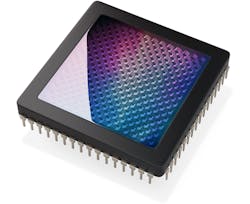Lumotive unveils metasurface-based lidar systems for autonomous vehicles
To be useful, automotive lidar requires the repeated capture of an entire 3D scene, rather than just a point or line; to accomplish this, a lidar system can either be flash-based (relying on a single, spatially diffused laser pulse and time-of-flight imaging optics) or based on beam-scanning. While beam-scanning greatly simplifies the receiving optoelectronics, it requires a method of moving a beam in 2D densely, accurately, and reliably.
Beam-scanning lidar systems used a mechanical beam scanner—which comes with all the potential problems of mechanical systems: complexity, wear and resulting inaccuracy, and mechanical failure—while newer breeds of lidar sensors utilize MEMS mirrors or optical phased arrays. However, both of these recent approaches lack performance due to the small optical aperture of MEMS mirrors and the low efficiency of phased arrays.
Mass-manufacturable high-performance lidar
Now, Lumotive (Seattle, WA), a Bill Gates-funded startup developing lidar systems for autonomous vehicles, has unveiled its own nonmechanical beam-steering technology based on a reflective optical metasurface combined with a liquid crystal layer. The silicon-based metasurface can be manufactured using standard CMOS technology, enabling straightforward mass-production of the unit. The Lumotive system is high-performance: its large (25 x 25 mm) optical aperture delivers long range, a 120-degree field-of-view with high angular resolution, and fast random-access beamsteering, according to Lumotive.
"Lumotive's solution is ideal for automakers and Tier-1s seeking safer yet more cost-effective perception solutions for their vehicles," says Lumotive cofounder and CEO William Colleran. "Our lidar sensors benefit tremendously from the unique attributes of beam-steering LCMs [Liquid Crystal Metasurfaces, the company's brand name for the system] which simultaneously offer large optical aperture, wide field of view, and fast scanning while having no moving parts. LCMs deliver the combination of performance and commercial viability that will finally eliminate barriers to adoption of lidar for both ADAS [Advanced Driver Assistance Systems] and autonomous vehicles."
Lumotive says that initial production units will be available to select customers for beta testing in the third quarter of 2019.
Source: Lumotive

John Wallace | Senior Technical Editor (1998-2022)
John Wallace was with Laser Focus World for nearly 25 years, retiring in late June 2022. He obtained a bachelor's degree in mechanical engineering and physics at Rutgers University and a master's in optical engineering at the University of Rochester. Before becoming an editor, John worked as an engineer at RCA, Exxon, Eastman Kodak, and GCA Corporation.
